Planning worship?
Check out our sister site, ZeteoSearch.org,
for 20+ additional resources related to your search.
- |
User Links
Person Results
‹ Return to hymnal
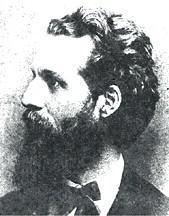
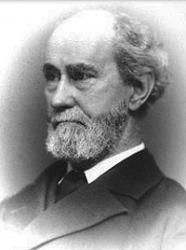
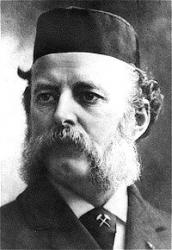
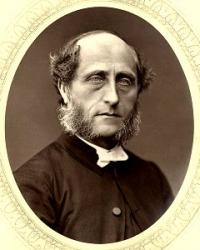
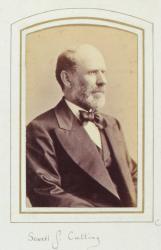

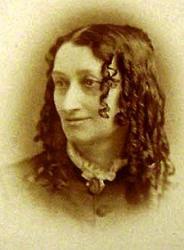
Export as CSV
Alexander Clark

1835 - 1879 Hymnal Number: d47 Author of "Always with us" in The Wave of Sunday School Song Clark, Alexander, D.D., born March 10, 1835, died July 6, 1879. Dr. Clark was for many years a Minister of the American Methodist Episcopal Church, and the editor of the Methodist Recorder, published at Pittsburgh. Two of his hymns:—
1. Heavenly Father, bless me now. Lent.
2. Make room for Jesus. Lent.
are given in I. D. Sankey's Sacred Songs & Solos.
--John Julian, Dictionary of Hymnology (1907)
=========================
Clark, Alexander, D.D. (March 10, 1835--July 6, 1879). Of Scottish descent, he was born in Jefferson County, Ohio, and received his education in the common schools, guided by a very competent father. After teaching in the public schools of Ohio for some years, he founded and edited Schoolday Visitor, a young people's journal which he published by himself in Knoxville, Ohio. It reached a circulation of more than 30,000 and eventually was merged with St. Nicholas, a well-known magazine for youth.
Originally a Presbyterian, he joined the Methodist Protestant Church and received his preaching license in 1862. For four years, from 1866, he served the First Methodist Protestant Church, Pittsburgh, and then became editor of the Methodist Recorder and the Sunday School papers of his church, retaining that position until his death. Chairman of the Committee which compiled the Voice of Praise, 1872, he was largely responsible for including in it much new hymnic material. He was the author of five hymns which were included in the book. His "Heavenly Father, bless me now," originally in six four-line stanzas, continued in the series of Methodist Protestant hymnals through that of 1901. Stanzas 1, 2, 5, 6, are in 0/1935. [note: up to 1966 Methodist Hymnal.]
He was the recipient of honorary degrees from Mt. Union College, Otterbein University, and Ohio Wesleyan University. While on a lecture tour in Georgia, he became ill at Atlanta and was taken to the Executive Mansion by the then Governor Colquitt, where he died after three weeks' severe suffering. The following glowing tribute to Dr. Clark by Colonel Robert G. Ingersoll, nationally known atheist writer and lecturer of the late nineteenth century was published in the Methodist Recorder, July 26, 1879:
"Upon the grave of Rev. Alexander Clark I wish to place one flower. Utterly destitute of cold dogmatic pride that often passes for the love of God, without the arrogance of the 'elect'--simple, free, and kind--this earnest man made me his friend by being mine. I forgot that he was a Christian, and he seemed to forget that I was not, while each remembered that the other was a man.
Frank, candid and sincere, he practiced what he preached, and looked with the holy eyes of charity upon the failings and mistakes of men. He believed in the power of kindness, and spurned with divine sympathy the hideous gulf that separates the fallen from the pure. Giving freely to others the rights that he claimed for himself, it never occurred to him that his God hated a brave and honest unbeliever. He remembered that even an infidel has rights that love respects; that hatred has no saving power, and that in order to be a Christian it is not necessary to become less of a man. He knew that no one can be maligned into kindness; that epithets cannot convince; that curses are not arguments, and the finger of scorn never points toward heaven. With the generosity of an honest man, he accorded to all the fullest liberty of thought, knowing, as he did, that in the realm of mind a chain is but a curse.
He sympathies were not confined within the prison of a creed, but ran out and over the walls like vines, hiding the cruel rocks and rusted bars with leaf and flower. He could not echo with his heart the fiendish sentence of eternal fire. In spite of book and creed, he read 'between the lines' the words of tenderness and love, with promises for all the world. Above, beyond the dogmas of his church--humane even to the verge of heresy--causing none to doubt the love of God because he failed to hate his unbelieving fellow-men--he labored for the welfare of mankind, and to his work gave up his life with all his heart."
An intimate friend of William Cullen Bryant and other well-known authors, he was considered an exceptionally fine lecturer and his work as editor and author was highly regarded. Among his published works are:
The Old Log Schoolhouse, 1864
Working Christianity, or, the Gospel in the Trades, 1878.
--Robert G. McCutchan, DNAH Archives
Alexander Clark
Harriet Auber
1773 - 1862 Hymnal Number: d154 Author of "Unto the Lord gladly we raise" in The Wave of Sunday School Song Auber, Harriet, daughter of Mr. James Auber, b. in London, Oct. 4, 1773. During the greater part of her quiet and secluded life she resided at Broxbourne and Hoddesdon, Herts, and died at the latter place on the 20th Jan., 1862. Miss Auber wrote devotional and other poetry, but only a portion of the former was published in her Spirit of the Psalms, in 1829. This collection is mainly her work, and from it some useful versions of the Psalms have been taken and included in modern hymn-books, about 20 appearing in Spurgeon's Our Own Hymn Book, 1866. Miss Auber's name is widely known, but it is principally through her exquisite lyric, "Our blest Redeemer, ere He breathed," and the Epiphany hymn, "Bright was the guiding star that led." (For criticism of her work, see English Psalters, §. 17.)
In addition to these and other hymns by Miss Auber, which are annotated under their respective first lines, the following are also in C. V., but principally in America:—
1. Arise, ye people, and adore. Easter.
2. As Thy chosen people, Lord. Ps. lxciii.
3. Can guilty man indeed believe? Ps. xciv.
4. Delightful is the task to sing. Ps. cxlvii.
5. Father of Spirits, Nature's God. Ps. cxxxi.
6. Hail, gracious Source of every good. Ps. Ixv.
7. Hasten, Lord, the glorious time. Ps. lxxii.
8. Jehovah reigns, O earth, rejoice. Ps. xccii.
9. Join, all ye servants of the Lord. H. Scriptures.
10. Jesus, Lord, to Thee we sing. Ps. cx.
11. O all ye lands, rejoice in God. Ps. lxvi.
12. O God our Strength, to Thee the song. Ps. lIxxxi.
13. O praise our great and gracious Lord. Ps. lxxviii.
14. On thy church, O power divine. Ps. lxvii.
15. Sweet is the work, O Lord. Sunday.
16. That Thou, O Lord, art ever nigh. Ps. lxxv.
17. The Lord, Who hath redeemed our souls. Ps. xxxi.
18. When all bespeaks a Father's love. Ps. set.
19. When dangers press and fears invade. Ps. lxii.
20. Who, O Lord, when life is o'er. Ps. xv.
21. Whom have we Lord, in heaven, but Thee. Ps. lxxiii.
22. Wide, ye heavenly gates, unfold. Ascension.
23. With hearts in love abounding. Ps. xlv.
24. With joy we hail the sacred day. Sunday.
25. Vainly through the night the ranger. Ps. cxvii.
All these psalm-versions and hymns are from her Spirit of the Psalms, London, 1829.
- John Julian, Dictionary of Hymnology (1907)
=========================
Auber, Harriet, p. 90, ii. The following versions of psalms from her Spirit of the Psalms, 1829, are also in common use:-
1. Great God, wert Thou extreme to mark. Ps. cxxx. "Thy servants in the temple watched," begins with stanza ii. of this.
2. How blest are they who daily prove. Ps. xli.
3. How blest the children of the Lord. Altered from Ps. cxii.
4. Jehovah, great and awful name. Part of Ps. Ixxviii.
5. 0 Thou Whom heaven's bright host revere. Ps. Ixxxiv.
6. Praise the Lord, our mighty King. Ps. cxxxv.
7. Spirit of peace, Who as a [celestial] Dove. Ps. cxxxiii.
8. Thou by Whose strength the mountains stand. Ps. Ixv.
9. To heaven our longing eyes we raise. Ps. cxxi.
10. Vainly through night's weary hours. Ps. cxxvii. Sometimes "Vainly through the night the ranger."
11. While all the golden harps above. Easter.
--John Julian, Dictionary of Hymnology, Appendix, Part II (1907)
See also in:Hymn Writers of the Church
Harriet Auber
Emma Pitt
b. 1846 Hymnal Number: d134 Author of "We are coming, gladly coming On this anniversary day" in The Wave of Sunday School Song Born: 1846, Maryland.
Pitt was living in Baltimore, Maryland, by 1880, and through at least 1910. She may have died before 1920, as the daughter with whom she was living in 1910 was on her own and still single in 1920.
--www.hymntime.com
Emma Pitt
Robert Morris

1818 - 1888 Hymnal Number: d18 Author of "O Galilee, sweet [blue] Galilee, where Jesus loved so much" in The Wave of Sunday School Song Morris, Robert, LL.D., born Aug. 31, 1818, is a member of the Presbyterian Church, and an extensive writer on Freemasonry. In 1868 he visited the Holy Land on behalf of the Freemasons of America, the outcome of which was his work, Freemasonry in the Holy Land. He is the author of some 300 poetical pieces. One of these, "Each gentle dove and sighing bough" (Evening), is in H. R. Palmer's Songs of Love for the Bible School, 1874, Sankey's Sacred Songs and Solos, 1881, &c..
--John Julian, Dictionary of Hymnology, Appendix, Part II (1907)
Robert Morris
Rossiter W. Raymond

1840 - 1918 Hymnal Number: d115 Author of "Star, beautiful star" in The Wave of Sunday School Song Raymond, Rossiter Worthington, PH.D., was b. in Cincinnati, Ohio, April 27,1840. He graduated at Brooklyn Polytechnic, 1858, and also studied in Germany. He served in the Civil War of 1861-4 with the grade of Captain. Since then he has practised in New York as a consulting mining engineer. He was editor of the American Journal of Mining, and is a contributor to scientific literature. He has also written stories for children, a Paraphrase of Job, and some fugitive poetry. His hymns in common use include:—
1. Far out on the desolate billow. [God everywhere.] Written for the German tune, "Ich weiss nicht was soil es bedeuten," and published in The Plymouth Hymnal, 1894.
2. Morning red, Morning red. [Easter.] Written to the tune" Morgenroth," a German battle-song, and published in the American Book of Praise.
3. Now rest, ye pilgrim host. [Reviewing the Past.] This hymn is dated 1879, and was written for the 50th anniversary oi the Brooklyn Sunday School Union. It was included in The Plymouth Hymnal, 1891, No. 509, and, after revision by the author, in Sursum Corda, 1898, and other collections.
4. 0 Thou Who art inspiring. [Submission.] Appeared in The Plymouth Hymnal, 1894, No. 635, and later in other collections.
5. The God Who spann'd the heavens above. [Courage in Conflict.] "Written for my Sunday School, to be sung to the tune of the German patriotic song, ‘Der Gott, der Eisen wachsen liess' (by Arndt, p, 79, ii.), of which my first line is an evident and intentional imitation, though the remainder is not" (Author's MS.). It was published in The Book of Praise, the Sursum Corda, 1898, and others. It is sometimes attributed to "J. Clark,” but in error.
6. There dwelt in old Judaea. In Allon's Children's Worship, 1878.
Of the above Nos. 1, 2, 5 are in W. B. Bradbury's Clarion, 1867. Dr. Raymond is a Congregationalist, and is associated with the Plymouth Church, Brooklyn. [Rev. L. F. Benson, D.D.]
--John Julian, Dictionary of Hymnology, New Supplement (1907)
Rossiter W. Raymond
S. W. Straub
1842 - 1899 Hymnal Number: d151 Author of "The beautiful summer land" in The Wave of Sunday School Song Solomon.W Straub Solomon was the brother of Maria Straub. His father Joseph was a farmer. His parents, who were of German descent.
From Hymnary user, via email
S. W. Straub
Christopher Newman Hall

1816 - 1902 Hymnal Number: d127 Author of "To arms, to arms, ye soldiers" in The Wave of Sunday School Song Hall, Christopher Newman, LL.B., son of J. Vine Hall, was born at Maidstone, May 22, 1816, and educated at Totteridge School, and Highbury College, London. In 1841 he graduated B.A. at the University of London, and LL.B. in 1856. From 1842 to 1854 he was minister of Albion Church, Hull; and from 1854 he has been in charge of Surrey Chapel, and its continuation, Christ Church, Westminster. He was also chairman of the Congregational Union of England and Wales in 1876. In addition to several prose works, and numerous tracts (one of which, "Come to Jesus," has been translated into 30 languages and has reached a circulation of two millions), he published:—
(1) Hymns composed at Bolton Abbey, and Other Rhymes, Lond., Nisbet, 1858; (2) Cloud and Sunshine, Lond., Hamilton, Adams & Co., 1870; (3) Christ Church Hymnal, for the use of the Congregation of Christ Church, Westminster Road, Lond., Nisbet, 1876; (4) Pilgrim Songs in Sunshine and Shade, Lond. 1870 (this is No. 1 with additional verses); (5) Supplemental Pilgrim Songs; and (6) Songs of Earth and Heaven, Lond., Hodder & Stoughton, 1886.
In the Christ Church Hymnal, 1876, there are 82 original hymns by Mr. Hall, 10 of which previously appeared in his Hymns composed at Bolton Abbey, &c, 1858. All the 82 hymns are signed “N. H." Of his hymns the most popular are, "Accepting, Lord, Thy gracious call"; "Friend of sinners, Lord of glory"; and "Hallelujah, joyful raise" (q.v.). In addition the following are also in common use outside of his Hymnal:—
1. Come, Lord, to earth again (1876). Advent.
2. Day again is dawning (1872). Morning.
3. Friend of sinners, hear my cry (1844). Lent.
4. God bless our dear old England (1876). National Hymn.
5. I know who makes the daisies. Providence.
6. Lord, we do not ask to know (1876). Missions.
7. O Jesus, Who to favoured friend (1876). B. V. M. given into the charge of St. John. [Rev. W. Garrett Horder]
-- John Julian, Dictionary of Hymnology
=====================
Hall, C. N., p. 481, i. Several recent hymns are included in his Lyrics of a Long Life, 1894. The additional hymns which have come into use since 1890 include:—
1. Come to Jesus! Friend of sinners. [Jesus the Saviour.] Lyrics, 1894, p. 176. Previously in Congregational Sunday School, Supplement, 1891, and School Hymns, 1891, as "Come to Jesus! Mighty Saviour."
2. I want to live and be a man. [Manliness.] Lyrics, 1894, p. 240, headed "A Boy's Hymn." A response to "I want to be an Angel" [p. 559, i.]. Previously in School Hymns, 1891, No. 334.
3. I've wandered far from home. [The Prodigal.] Pilgrim Songs, 1871, p. 17; Christian Endeavour Hymnal, 1896.
4. Lord! we obey Thy kind command. [Repentance.] Lyrics, 1894, p. 193. Previously in School Hymns, 1891, No. 137, as "Lord! I obey."
5. 0 for the love, the perfect love. [Fearless Love.] Lyrics, 1894, p. 199. Previously in School Hymns, 1891, No. 482.
6. To David's Son, Hosanna. [Hosanna to Jesus.] In Christ Church Hymnal, 1876, No. 550, the Sunday School Hymnary, 1905, &c.
Mr. Hall died Feb. 18, 1902. [Rev. James Mearns, M.A.]
--John Julian, Dictionary of Hymnology, New Supplement (1907)
Christopher Newman Hall
Otis F. Presbrey
1820 - 1901 Hymnal Number: d14 Author of "Day by day, where'er I journey, As I bear my heavy load" in The Wave of Sunday School Song
Otis F. Presbrey
Grace Glenn
Hymnal Number: d20 Author of "We are going, we are going" in The Wave of Sunday School Song Pseudonym. See also a href="http://www.hymnary.org/person/Bateman_LM">Bateman, L. M. Beal, Mrs. (Lucinda M.), b. 1843
Grace Glenn
W. Shrubsole
1759 - 1829 Person Name: William Shrubsole Hymnal Number: d149 Author of "When, streaming from the eastern [eternal] skies" in The Wave of Sunday School Song William Shrubsole was born in Sheerness, Kent, in 1759. His first occupation was as a shipwright in Sheerness Dockyard, but he was promoted, and afterwards removed to London, where he at length held the position of Secretary to the Committee of the Treasury in the Bank of England. He died at Highbury, in 1829. Mr. Shrubsole was the author of several hymns, and some articles in the religious magazines of his day.
--Annotations of the Hymnal, Charles Hutchins, M.A. 1872.
=============================
Shrubsole, William, eldest son of William Shrubsole, a master mastmaker in the dockyard at Sheerness, Kent, and a Lay Preacher, was born at Sheerness, Nov. 21, 1759. In his earlier years he was engaged as a shipwright in the dockyard, and then as a clerk. In 1765 he removed to London, and entered the Bank of England as a clerk. He subsequently became the Secretary to the Committee of the Treasury. He died at Highbury, Aug. 23, 1829. Mr. Shrubsole was for some time a communicant at St. Anne's, Blackfriars, during the incumbency of the Rev. W.Goode; but during the last twenty years of his life he was a member with the Congregationalists, and attended the Hoxton Academy Chapel. He interested himself in religious societies, and especially the London Missionary Society (of which he became a director and one of the secretaries), the Bible Society, and the Religious Tract Society. He contributed hymns to the Evangelical Magazine, the Christian Magazine, the Theological Miscellany, the Christian Observer and the Youths' Magazine, at various dates, from 1775 to 1813. To these works we have traced nearly twenty of his hymns. A Memoir of Shrubsole was contributed by his daughter to Dr. Morison's Fathers and Founders of the London Missionary Society, 2 vols., London, Fisher, Sons & Co., 1844. Seven of his hymns are also given, together with a portrait, in the same work. His hymns in common use include:—
1. Arm of the Lord, awake, awake. Put on Thy strength, the nations shake. Missions. This appeared in Missionary Hymns, 1795; and in Morison's Fathers and Founders, &c, 1844, vol. i. p. 451, in 6 stanzas of 4 lines. Dr. Rogers in his Lyra Britannica, 1867, attributes this hymn to Shrubsole's father, and dates it 1780. Against this statement we can only put the fact that it is claimed in Morison for the son. Original text, Lyra Britanica, 1867, p. 502.
2. Bright as the sun's meridian blaze . Missions. Written Aug. 10, 1795, for the first meeting of the London Missionary Society. It was printed in the Evangelical Magazine, Sept., 1795, headed “On the intended Mission," and signed "Junior." It is also in Morison, 1844, i. p. 449, together with the note that the hymn "was duly acknowledged by Mr. Shrubsole in his lifetime, and the original manuscript, with numerous corrections, is in possession of his family, in his own autograph," and that it bears date "August 10, 1795." Original text Lyra Britanica, 1867, p. 504.
3. In all the paths my feet pursue. Looking unto Jesus. Appeared in the Evangelical Magazine, 1794; in Morison, i., 1844, p. 454; and Lyra Britanica, 1867, p. 503.
4. Shall science distant lands explore? Missions. Published in the Evangelical Magazine, 1795; and again in Morison, 1844, i. p. 452.
5. When streaming from the Eastern skies . Daily Duties; or, Morning. Published in the Christian Observer, Aug., 1813, in 8 stanzas of 8 lines, headed "Daily Duties, Dependence and Enjoyment," and signed Probus. Also in Morison, 1844, i. p. 453; and Lyra Brittanica, 1867, p. 505. The well-known cento, "As every day Thy mercy spares," is from this hymn, and begins with st. iii.
6. Ye saints, your grateful praises bring
W. Shrubsole
W. E. Littlewood
1831 - 1886 Hymnal Number: d113 Author of "Jesus' love, precious love, boundless" in The Wave of Sunday School Song Littlewood, William Edensor, M.A., born in London, Aug. 2, 1831, educated at Pembroke College, Cambridge (B.A. 1854), and Vicar of St. James's, Bath, 1872-81. Published A Garland from the Parables, 1857, from which "There is no love like the love of Jesus" (Love of Jesus) is taken. He died Sept. 3, 1886.
--John Julian, Dictionary of Hymnology, Appendix, Part II (1907)
W. E. Littlewood
Mary E. Leslie
b. 1831 Hymnal Number: d22 Author of "Gathering, gathering home" in The Wave of Sunday School Song Leslie, Mary Eliza, is daughter of Andrew Leslie, for many years Baptist missionary in Calcutta, was born at Monghyr, Jan. 13, 1831, became a member of her father's church, and having received a superior education, was for eight years Superintendent of an Institution for the education of Hindoo young ladies. Since 1877 Miss Leslie has been engaged in various kinds of philanthropic work in Calcutta. Her publications include:—
(1) Ina and Other Poems, 1852. (2) Sorrows and Aspirations, 1858. (3) Heart Echoes from the East; or Sacred Lyrics and Sonnets (London, Nisbet, 1861). (4) The Dawn of Light; a Story for Hindoo Women, 1867. (5) Eastern Blossoms; a Story for native Christian Women, 1875. (6) A Child of the Day, 1882.
In the Heart Echoes from the East is a lyric beginning "They are gathering homeward from every land (Death contemplated), which has been exceedingly popular, and has been reprinted in many forms. It is in W. R. Stevenson's School Hymnal, 1880. Several of Miss Leslie's lyrics and sonnets are very good, and worthy of the attention of hymn-book compilers. [Rev. W. R. Stevenson, M.A.]
--John Julian, Dictionary of Hymnology (1907)
Mary E. Leslie
F. B. Harris
1850 - 1909 Person Name: Flora L. Best Harris Hymnal Number: d138 Author of "Crown of life" in The Wave of Sunday School Song Birth: 1850, USA
Death: Sep., 1909
Flora Lydia (Best) Harris was the daughter of Dr. David and Elizabeth (Lockart) Best. She was the 1st wife of Rev. Bishop Merriman Colbert Harris. He was a minister in the Pittsburgh Conference of the Methodist Episcopal Church. She was a writer and wrote on Japanese themes. In 1891 she translated the 10th century classic 'Tosa Niki' ('Diary or Log of a Journey From Tosa to Kyoto').
Mary Jane Haight-Eckert on Find A Grave web site
F. B. Harris
Frances L. Mace
1836 - 1899 Hymnal Number: d79 Author of "Waiting, waiting, waiting" in The Wave of Sunday School Song Mace, Frances P., née Laughton, was born in Orono, Maine, Jan. 15, 1836, and married in 1855 to Benjamin H. Mace, a Lawyer of Bangor. Her hymn "Only waiting till the shadows" (Heaven Anticipated), was written in 1854, and printed in a local newspaper, the Waterville Mail (Maine), Sep. 7, 1854, in 4 stanzas of 8 lines. It has attained a wide circulation in Great Britain and America. Full text in I. D. Sankey's Sacred Songs & Solos, 1878. See Woman in Sacred Song, 1885, p. 139, for counter-claim on behalf of Mrs. F. A. F. Wood-White.
--John Julian, Dictionary of Hymnology, Appendix, Part II (1907)
==================
Born: January 15, 1834, Orono, Maine.
Died: July 20, 1899.
Buried: Los Gatos Memorial Park, San Jose, California.
In 1837, Frances’ family moved to Foxcroft (now Dover-Foxcroft), Maine, where she grew up. By age 10, she was studying Latin, and had verses published by age 12. The family later moved to Bangor, Maine, where she graduated from high school, and studied German and music with private teachers. In 1855, she married lawyer Benjamin F. Mace of Bangor; in 1885, they moved to San Jose, California. They had eight children, four of whom reached adulthood. Her works include:
Legends, Lyrics and Sonnets, 1883
Under Pine and Palm, 1888
Sources:
Willard, pp. 482-83
http://www.hymntime.com/tch/bio/m/a/c/mace_fl.htm
Frances L. Mace
Sewall S. Cutting

1813 - 1882 Person Name: Sewall Sylvester Cutting Hymnal Number: d72 Author of "O Savior, I am blind" in The Wave of Sunday School Song Cutting, Sewell Sylvester, D.D., a Baptist Minister, was born at Windsor, Vermont, Jan. 19, 1813, graduated at the University of Vermont, 1835, and was ordained at Boylston, Massachusetts, 1836. He was pastor at Southbridge, Mass., from 1837 to 1845. Editor of the New York Recorder. 1845-50, and 1853-55; and of the Christian Review, 1850-53, and 1855-68. In 1868 he was appointed Professor of Rhetoric and History at the University, Rochester, N. York, and Secretary of the American Baptist Educational Commission. He died at Brooklyn, Feb. 7, 1882. His Historical Vindication of the Baptists was published in 1858.
His hymns in common use include:—
1. Father, we bless the gentle care. The love of God. Appeared in Hymns for the Vestry and Fireside, Boston, 1841.
2. Gracious Saviour, we adore Thee. Holy Baptism. Appeared in Winchell's Additional Hymns, 1832, No. 509 (the author being then but 19); again in the Psalmist, 1843, and others.
3. Great God, Thy glories blaze. Praise to God the Father. Appeared in Linsley and Davis's Select Hymns, 1836-41, No. 514. In the Psalmist, 1843, it was altered to "God of the world, Thy glories shine." This is repeated in several collections, including the Baptist Praise Book, 1871, in 4 stanzas of 4 lines. In the Baptist Service of Song, 1871, it is given as "God of the world, near and afar," is expanded into 5 stanzas, and is dated 1835.
4. 0 Saviour, I am blind, Lead Thou my way. The True Guide. This hymn, in I. D. Sankey's Sacred Songs and Solos, is also by Dr. Cutting. [Rev. F. M. Bird, M.A.]
--John Julian, Dictionary of Hymnology (1907)
Sewall S. Cutting
Leonard Bacon

1802 - 1881 Hymnal Number: d129 Author of "Wake the song of jubilee" in The Wave of Sunday School Song Leonard Bacon, D.D., was born in Detroit (where his father was a missionary to the Indians), February 19, 1802, and educated at Yale college and at Andover. In 1825 he was ordained Pastor of the Centre Church, New Haven, and retained that charge until 1866, when he was appointed Professor of Theology in Yale Divinity School. This professorship he resigned in 1871; but till his death in 1881, he was Lecturer on Church Polity. He died December 23, 1881. Dr. Bacon rendered important service to hymnology both as writer and compiler. While a student at Andover, he edited an important and now rare tract entitled Hymns and Sacred Songs for the Monthly Concert [of Prayer for Missions], Andover, September 1823. This contained the three hymns following, which are his:-
Weep not for the saint that ascends. Death of a Missionary.
Land where the bones of our father are sleeping. Missions. This was brought into notice in Great Britain through its insertion in the Evangelical Magazine, March, 1824.
Wake the song of jubilee. Missions. Of these No. 1 is found in Lyra Sac. Amer., p. 6 and No. 3 was adopted, with alterations, by Pratt in his Ps. and Hys. (Lond. Seeley & Co,. 1829), fro which it passed into Greene and Mason's Church Psalmody, 1831, and the Church Psalmist of the Evangelical Christians (N. Y., 1845, 7th ed.). This altered text, with some further changes, was adopted by the author in his Appendix to T. Dwight's revised ed. of Watt's Psalms, 1833. This Appendix also contained three newe hymns by him, viz.:-
Though now the nations sit beneath. Missions. This is based on a hymn by Sarah Slinn, "Arise in all Thy splendour, Lord" (q.v.), which Dr. Bacon had partly rewritten for his Andover Tract, above noted. In the Appendix to Dwight he substituted new verses for what remained of her's in the Tract, and then justly claimed the whole as his own.
O Thou Who hast died to redeem us from hell. Holy Communion.
God of our fathers, to Thy throne. Thanksgiving. In 1845 Dr. Bacon was joint compiler with Dr. E. T. Fitch, and several others, of Psalms & Hymns for Christian Use and Worship,, pub. "by the General Association of Connecticut."
To this collection he contributed the four hymns following:-
Here, Lord of life and light, to Thee. Institution of a Minister. This was written March 9, 1825, for his installation as pastor of the First Church, New Haven, and first published as above, No. 559, in 4 stanzas of 4 lines, and headed "Ordination in an ancient New England Church."
O God, beneath They guiding hand. American Anniversary Hymn. This is a favorite American Anniversary hymn. It is abbreviated and altered from his hymn, "The Sabbath morn is as bright and calm," which he wrote for the Bicentenary of New Haven, 1833. In this revised form it was first published as above, No. 619, in 5 stanzas of 4 lines, and appointed "For the twenty-second of December."
O God of Abraham, ever sure. Prayer on behalf of the Young. This was written as a substitute for Mrs. Hyde's "Dear Saviour, if these lambs should stray," the use of which was refused by the owners of the copyright of Nettleton's Village Hymns (1824). In the Psalms & Hymns, it is No. 635, in 4 stanzas of 4 lines, and headed "Prayer for the children of the Church."
Hail, tranquil hour of closing day. Evening. This popular hymns was written under the same circumstances as the preceding, and as a substitute for Mr.s Brown's Twilight hymn, "I love to steal awhile away." It is No. 706 of the Psalms & Hymns, 1845, in 5 stanzas of 4 lines, and entitled "Evening Twilight."
How sweet, thro' long remembered years. Evening. In the Church Praise Book., N.Y., 1882, No. 15, is composed of stanzas iii.-v. of No. 10.
--John Julian, Dictionary of Hymnology (1907)
Leonard Bacon
Una Locke

1820 - 1882 Person Name: Urania Locke Bailey Hymnal Number: d110 Author of "I know I am weak and sinful" in The Wave of Sunday School Song Urania Locke Bailey [Una Locke] was born on November 20, 1820 in Gill, Massachusetts and died on March 25, 1882.
Bailey’s works include:
I Want to Be an Angel (Boston, Massachusetts: Horace Partridge, 1857)
Clara, the Motherless Young Housekeeper, or, The Life of Faith (Carlton & Porter, Sunday School Union, 1860)
Una’s Papa, and Other Stories (Carlton & Porter, 1867)
Red Letter Days in Old England and New England (New York: Nelson & Phillips, 1871)
Star Flowers (New York: G. P. Putnam’s Sons, 1882)
http://www.hymntime.com/tch/bio/b/a/i/bailey_uls.htm
Una Locke
J. W. Slaughenhaupt
Hymnal Number: d36 Author of "Precious words of peace" in The Wave of Sunday School Song
J. W. Slaughenhaupt
E. F. C. Husted
Person Name: Ellen French C. Husted Hymnal Number: d59 Author of "Overflowing, overflowing ever" in The Wave of Sunday School Song Late 19th Century
E. F. C. Husted
Ella Dudley Cheek
Hymnal Number: d50 Author of "Jesus, I am waiting now" in The Wave of Sunday School Song
Ella Dudley Cheek
George S. Weeks
Hymnal Number: d78 Author of "One more hymn we'll sing at parting" in The Wave of Sunday School Song
George S. Weeks
W. H. Sherwood
Hymnal Number: d76 Author of "O hail, sweet Sabbath day" in The Wave of Sunday School Song
W. H. Sherwood
Fanny Church
Hymnal Number: d58 Author of "Sweetly chiming, Sabbath bell" in The Wave of Sunday School Song
Fanny Church
J. B. Vinton
Hymnal Number: d33 Author of "Storm the fort, for I am leading" in The Wave of Sunday School Song
J. B. Vinton
Fannie M. Chadwick
Hymnal Number: d106 Author of "Beautiful sunshine" in The Wave of Sunday School Song Late 19th Century
Fannie M. Chadwick
Ada Burns Watkins
Hymnal Number: d140 Author of "We will rally to the standard" in The Wave of Sunday School Song
Ada Burns Watkins
R. R. Raymond
Hymnal Number: d92 Author of "Then ringing, singing, fir and holly bringing" in The Wave of Sunday School Song
R. R. Raymond
D. N. Howe
Hymnal Number: d124 Author of "The river of life" in The Wave of Sunday School Song
D. N. Howe
S. H. Blakeslee
Person Name: S. Blakeslee Hymnal Number: d148 Author of "The Savior died for me" in The Wave of Sunday School Song
S. H. Blakeslee
Callene Fisk
Person Name: C. Fisk Hymnal Number: d77 Author of "Remember me" in The Wave of Sunday School Song Pseudonym. See also Crafts, Wilbur
Callene Fisk
S. Anna Gordon
b. 1832 Person Name: Anna Gordon Hymnal Number: d141 Author of "Ring the glad bells, the beautiful joy bells" in The Wave of Sunday School Song Mrs. S. Anna Gordon was born in Claremont, Mass., 9 January 1832. She was a physician and author. At an early age she moved to New York with her parents. Before her marriage she was a teacher. She was in charge of the ladies' department in Rock River Seminary and in Ripon College and was active in opening a normal school. She was married in Wisconsin in 1858 to W. A. Gordon M. D. After her marriage she studied medicine with her husband. She assisted him in his practice. In 1859 and 1860 they were connected with the Smithsonian Institute, taking meteorological motes. For one year she was associate editor of "Central Wisconsin." She joined her husband while he was stationed in Louisville, Ky. during the Civil War where she assisted with caring for wounded and sick soldiers. During that time, she also studied art. She was a weekly contributor to the literary columns of the Louisville "Sunday Journal." In 1882 and 1883 she was State editor of the Missouri Woman's Christian Temperance Union on the Chicago "Signal." During her residence in Denver, Col. she was assistant superintendent of Chines work in that city. She is author of the book Camping in Colorado and several papers and poems.
Dianne Shapiro, from "A Woman of the Century: fourteen hundred-seventy biographical sketches accompanied by portraits of leading American women in all walks of life" edited by Frances E. Willard and Mary A. Livermore, published by Charles Wells Moulton, 1893
S. Anna Gordon
John A. Williams
1817 - 1889 Person Name: J. A. Williams Editor of "" in The Wave of Sunday School Song
John A. Williams
D. A. Beale
Hymnal Number: d29 Author of "Come to the manger, come and worship" in The Wave of Sunday School Song
D. A. Beale
J. D. Wyckoff
Hymnal Number: d122 Author of "'Tis the song and story of Christ's sweet love" in The Wave of Sunday School Song
J. D. Wyckoff
John Scotford
Hymnal Number: d116 Author of "Beautiful valley" in The Wave of Sunday School Song
John Scotford
T. G. Chattle
Hymnal Number: d24 Author of "Hour of parting" in The Wave of Sunday School Song
T. G. Chattle
A. Sargent
Hymnal Number: d97 Author of "See, the church of Christ arises" in The Wave of Sunday School Song
A. Sargent
Carmichael
Hymnal Number: d93 Author of "Savior, Jesus, pass not by" in The Wave of Sunday School Song
Carmichael
Lillian Grafton Pence
Person Name: L. G. Pence Hymnal Number: d118 Author of "City like a bride" in The Wave of Sunday School Song
Lillian Grafton Pence
W. B. Cooper
Hymnal Number: d146 Author of "Neath the shadow of thy wing" in The Wave of Sunday School Song
W. B. Cooper
Samuel Rose at Methodist Book Room
Publisher of "" in The Wave of Sunday School Song
Samuel Rose at Methodist Book Room
N. Brum Clark
Hymnal Number: d101 Author of "Alleluia is the chorus" in The Wave of Sunday School Song
N. Brum Clark
W. H. H. Pearson
Hymnal Number: d145 Author of "When a few more years are blended" in The Wave of Sunday School Song
W. H. H. Pearson
P. S. Pennell
Hymnal Number: d4 Author of "O glorious hope, O unseen shore" in The Wave of Sunday School Song
P. S. Pennell


 My Starred Hymns
My Starred Hymns


